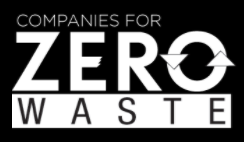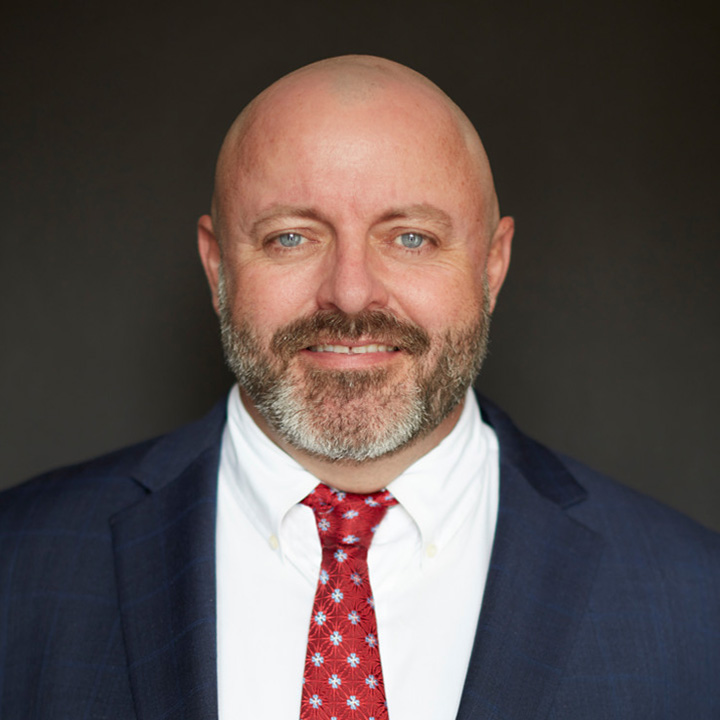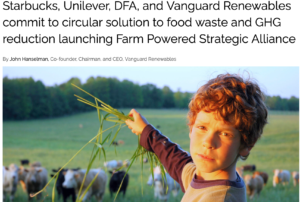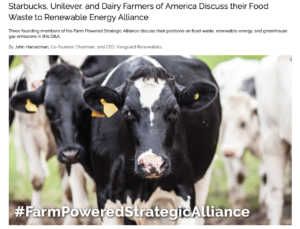As manufacturers in the United States make commitments to climate change and reducing their carbon footprint, it turns out that waste offers a transformative way for them to accomplish company goals says John Hanselman Co-founder, Chairman and CEO of Vanguard Renewables.
The reality is that converting to Renewable Natural Gas (RNG) does not require new infrastructure. John told Companies for Zero Waste that converting to RNG is a contractual change with a gas supplier and it requires literally, no changes to be made at plants that are currently using natural gas.
“It’s a double bonus for corporations to make the switch, when you use RNG, you reap massive benefits.”
As momentum continues to build around the importance of preserving the environment, carbon reduction, and climate change mitigation, John says important corporate stakeholders – customers and for public companies, shareholders, are demanding positive movement by corporations. Embracing new ways to reduce a company’s carbon footprint and minimize their impact on climate is a key element of the ESG movement on Wall Street that will have impact on corporate growth trajectory including customer loyalty and advocacy. Nearly every investment fund has an ESG group that audits portfolio companies to rate their commitments and achievements toward climate change mitigation, waste reduction, and decarbonization.
The easy things have been done, such as procuring wind and solar energy for electrification and working toward reductions in packaging and efficiencies in manufacturing processes at facilities, plants, and distribution centers. A common theme John sees amongst those joining the Farm Powered Strategic Alliance (FPSA) including founding members Unilever, Starbucks, and Dairy Farmers of America is a commitment to take action to reduce waste from manufacturing and supply chain operations and repurpose the unavoidable endemic waste at a Vanguard Renewables farm-based anaerobic digester. These companies are also committing to procure farm-derived renewable natural gas to reduce dependence on fossil fuels. Companies like these industry leaders are continually reviewing what they are doing and looking for best practices to continue waste reduction and reduce their carbon impact. John adds that RNG is particularly attractive as it offers a negative carbon intensity score, while wind and solar are neutral.
Even after ten years, John says that the potential benefit of converting food waste from one of the most dangerous greenhouse gases into beneficial RNG is still mind-blowing to him. Sequestering methane that would have otherwise gone into the atmosphere and turning it into something that benefits the common good is amazing.
“If food waste were a nation it would be third largest greenhouse gas emitter behind China and the US,” he adds.
A large majority of organic waste is sent to open-pit lagoons, landfills, or incinerators in the U.S., where extremely high methane content is lost or expelled into the atmosphere as the organic waste decomposes, especially food waste. And, since methane is known to being nearly 40 to 80 times worse than CO2 as a greenhouse gas, John says the RNG pathway is a perfect solution that works.
“It is a really low threshold of burden for companies to get in on the RNG opportunity, and yet they get huge paybacks from the carbon standpoint.”
All that really needs to be done is a redirection of the waste to a farm where the organic waste that was once destined to emit methane, is now in, actuality carbon negative, and then to buy back some of the RNG and use it as an energy source. The only thing that is holding this back is a lack of awareness and education about the process and the benefits for people and the planet.
“One of the goals of the Farm Powered Strategic Alliance’s is to elevate the importance of organic waste as a resource and part of a circular solution that is readily available and tremendously impactful.”
John Hanselman
Each day Vanguard processes 250 tons of manure and 700 hundred tons of unconsumable food waste. John says Vanguard and the founding members of Farm Powered Strategic Alliance are 100 percent behind, first and foremost, getting food into hands of people who are at risk. The food waste that is recycled at Vanguard’s farms is not suitable for human or animal consumption. It may be past expiration, off spec, damaged by temperature issues during transport, or spoiled to name a few scenarios.
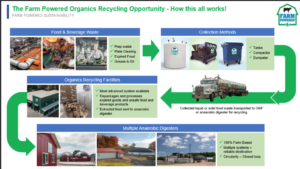
The organic waste is collected and delivered to the farm where it is combined with farm manure and processed in large sealed, airtight tanks called anaerobic digesters. Microbes naturally occurring in the manure consume the waste and release methane, which is captured and processed into renewable natural gas. The process is nearly odor free and the byproducts of the process – low carbon liquid fertilizer and dry bedding material for the animals contribute to regenerative agriculture practice at the farms.
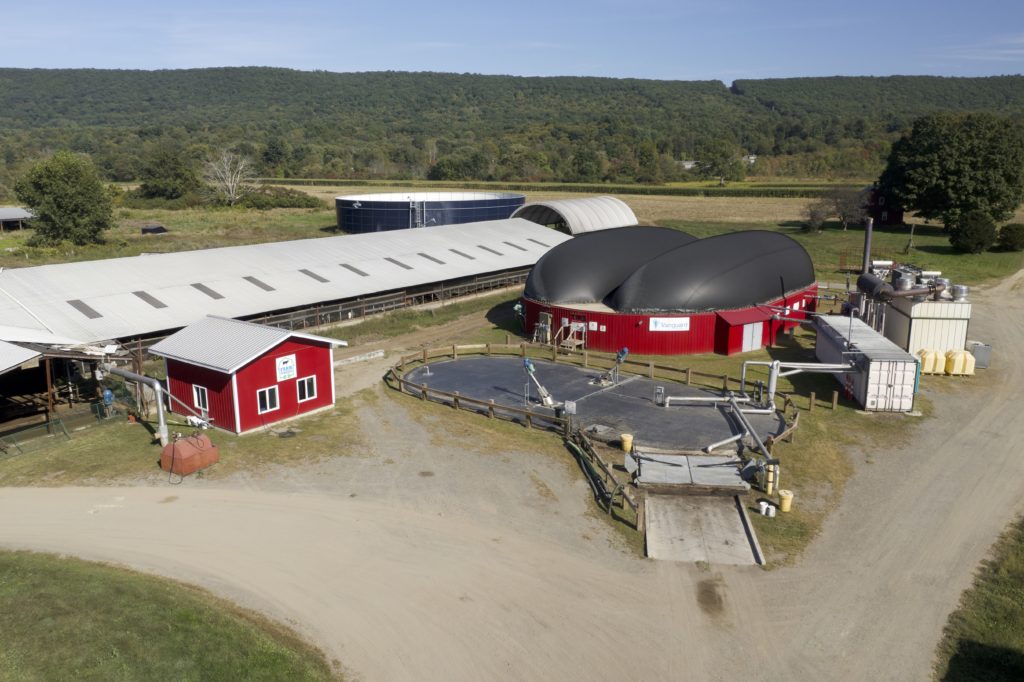
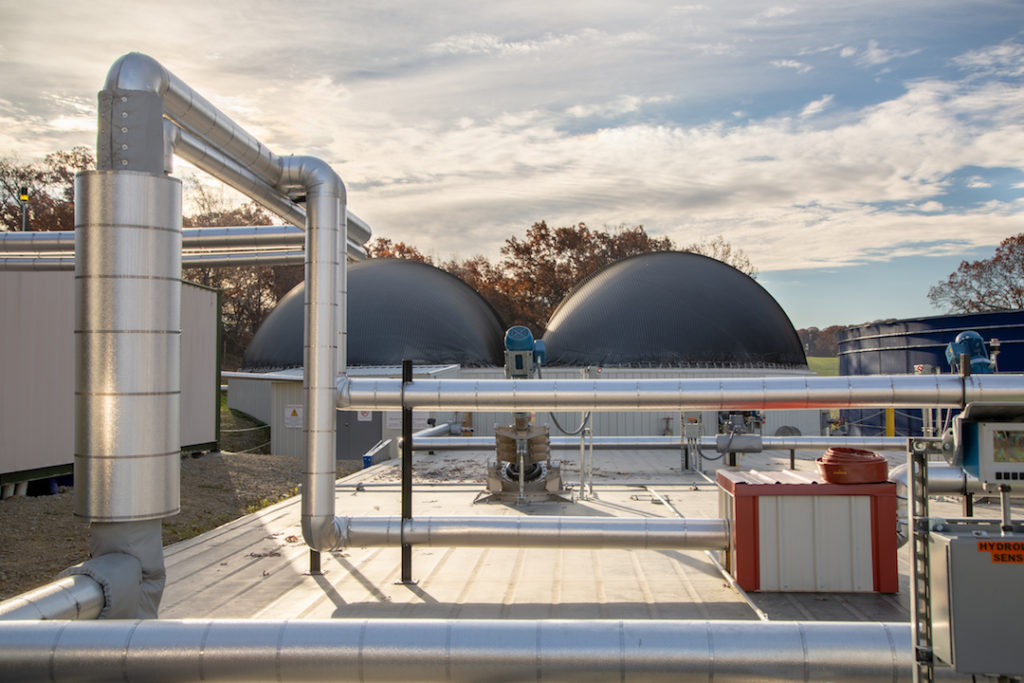
] 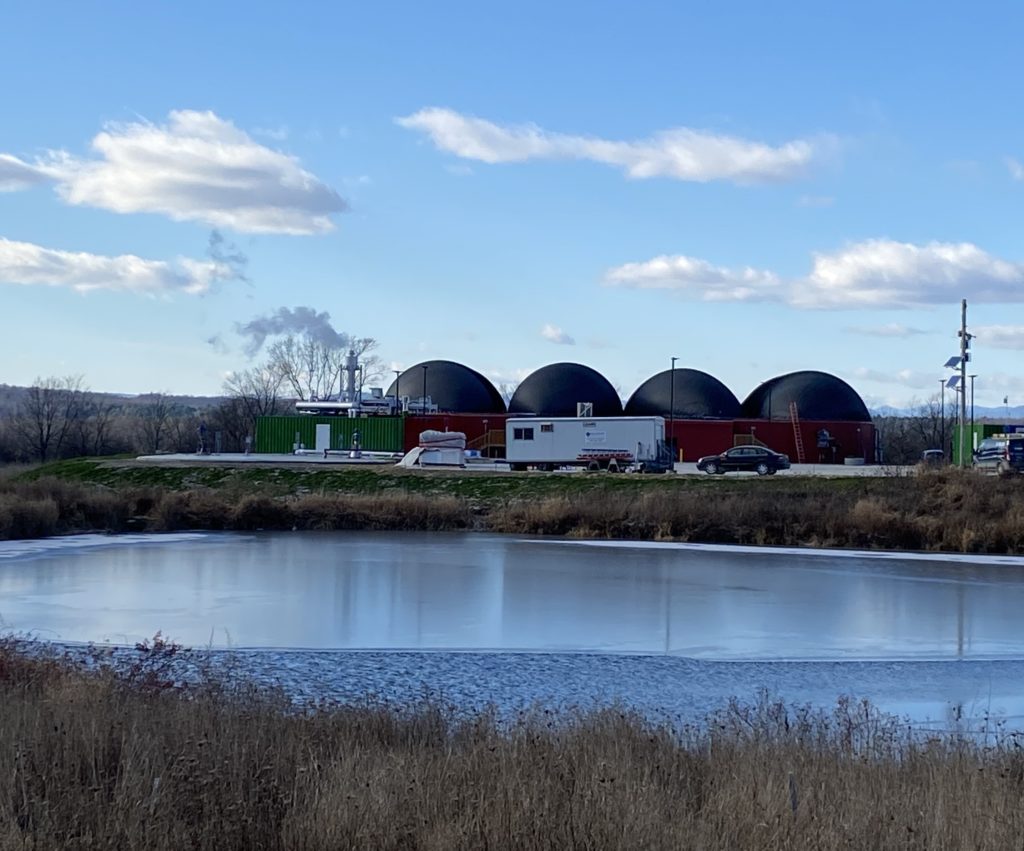
Vanguard’s Farm Powered® process captures 100 percent of the methane in its in raw form, which is then dried and cleaned, producing RNG to be used in homes and manufacturing plants, or CNG for vehicle fuel. Even better, the farm not only receives the valuable byproducts of the process, but they also get a lease payment for use of the land that helps diversify the farm income stream and preserve it for future generations.
John says, the Farm Powered Strategic Alliance is actively working to showcase the circular solution and the environmental and brand image benefits of committing to food waste reduction and repurposing unavoidable waste on farms and purchasing farm-derived renewable energy. He says it is more than just about minimizing a corporation’s carbon footprint, it is a huge step toward successfully mitigating climate change and sustaining family farms.
Continue the discussion with John at
CZW’s Virtual RoundTable February 18th:
Organic Waste to Renewable Natural Gas – A Circular Waste Solution That Supports Corporate Sustainability Goals and Sustains Family Farms.


About

Co-founder, Chairman and CEO, Vanguard Renewables
John Hanselman is Co-Founder, Chairman, and CEO of Vanguard Renewables, one of the largest recyclers of food waste in the United States. John is passionate about recycling organics once considered waste into renewable energy and low carbon fertilizer. His focus is developing organic waste and decarbonization solutions for food manufacturers, corporations, and food retailers and enhancing regenerative agriculture practices alongside Vanguard’s farm partners. Vanguard’s Farm Powered anaerobic digester facilities recycle food and farm waste into renewable energy.
John has more than thirty years of experience leading renewable energy, environmental, and mission-driven companies. Vanguard Renewables recently received the 2020 Energy Vision Leadership Award. The Company was named the National Waste & Recycling Association 2018 Organics Recycler of the Year. Vanguard’s Salisbury, Vermont anaerobic digester project received the 2019 American Biogas Council Up-and-Coming Project award and the Company’s Rutland, Mass. anaerobic digester won ABC’s 2019 Longevity Award. In 2016, the Farm Powered anaerobic digester in Hadley, Mass. was the American Biogas Council Project of the Year.
